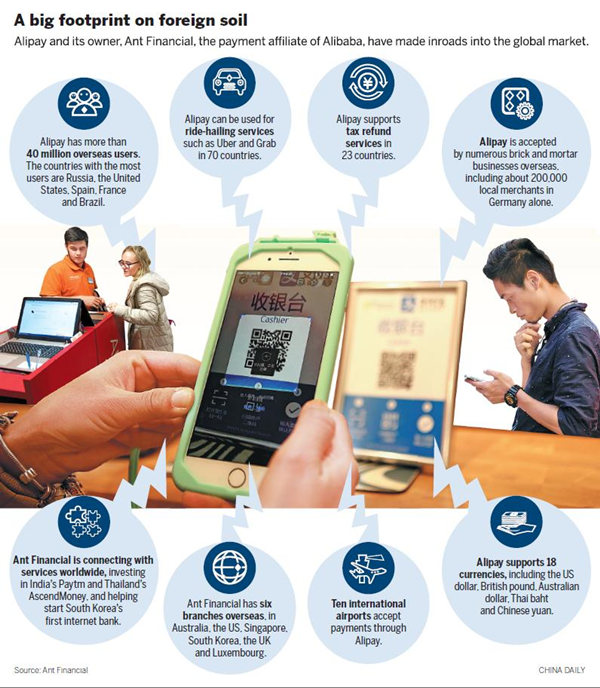Payment services make global expansion push
|
 |
When 33-year-old Shanghai resident Xu Lei walked into the Santa Claus Village tourism office in Rovaniemi, Finland, he was surprised to spot a sign with the Chinese word zhi.
That's the logo of Alipay, the fast-growing mobile payment service of China's e-commerce giant Alibaba. It meant Xu could use the Alipay mobile app on his phone to scan a QR code provided by the tourism office to pay for his Arctic Circle visit certificate, just like he would do in China.
"I was shocked, and felt that I now truly understood what a powerful and global organization Alipay is," Xu said.
In Japan, Li Yiying, a 25-year-old Chinese woman traveling in Tokyo, also benefited from payment services provided by Chinese companies.
"I often prefer to use Alipay or WeChat Pay (mobile payment provided by China's Tencent) instead of cash so I don't need to take a lot of paper money with me. It is also easier to keep track of transactions with the app," Li said.
From buying luxury bags to paying Uber bills, from convenience stores to theme parks, China's top wireless payment providers are tapping into the international market in the footsteps of globe-trotting and big-spending Chinese visitors.
Alipay has emerged a front-runner. Created in 2004 as a tool to facilitate transactions on Alibaba's Taobao e-commerce site, it is now accepted by more than 100,000 merchants overseas, according to a report from Ant Financial, the division of Alibaba that owns Alipay.
Ant Financial banks on its 450 million users in China as it rolls out business abroad. Alipay handled around half the estimated $738 billion Chinese spent online last year by offering an escrow service in collaboration with overseas partners such as banks, financial institutions and online payment providers, according to iResearch.
In Finland, Alipay is accepted by over 100 merchants, including hotels, shops and restaurants, through a partnership with local mobile payment firm ePassi. In Germany, its partnership with payment processing service Concardis gives it access to more than 200,000 local merchants.
Alipay also works with BNP Paribas, Barclays, Yusin Bank, SIX, Wirecard, Ingenico Group and other agencies in Europe, which helps it cover some 930,000 merchants in the continent.
In Japan, where Chinese tourists often buy expensive household electronics products, jewelry and cosmetics, Alipay is available at nearly 3,000 vendors.
To quench the thirst of wealthier Chinese buyers, Alipay was introduced to 10 major overseas airports across Germany, Japan and New Zealand in October. Departure tax refund services processed by Alipay are also available in 23 countries. It can be used to pay for Uber and Grab ride services in 70 countries.
Other domestic wireless payment provides like WeChat Pay and Baidu Wallet are also expanding overseas.
Tencent Holdings, a social networking giant, has allowed foreign stores since late 2015 to apply to be part of its WeChat payment system as long as they have a trading license and a website or an app. So far, the WeChat mobile system has been accepted in over 10 countries and regions.
Online search giant Baidu announced in September that it would join with Israeli startup Travelers Box to provide a convenient way for Chinese travelers to exchange their unused foreign money before returning home.
Travelers can choose to credit their Baidu Wallet accounts by depositing money at Travelers Box kiosks at airports in some of the most popular countries for Chinese tourists, including Japan, Italy and Canada.
The collaboration between Chinese and foreign companies is benefiting both sides. Shops that accept Chinese wireless payment systems, for example, see more Chinese customers.
But the ambitions of payment providers does not stop there.
Ant Financial intends to serve 2 billion customers over the next decade globally, with more than 60 percent of those users from outside the Chinese mainland.
Apart from setting up six branch offices — in the United States, Singapore, South Korea, the United Kingdom, Luxembourg and Australia — the company picked ex-Goldman Sachs banker Douglas Feagin to smooth the way for its global push.
Through signing pacts with financial institutions and distributing technology to retailers, the company is preparing the ground for what could become a major rival to banking monopolies and the likes of Visa.
In the US, Ant Financial teamed up with payment technology providers First Data Corp and Verifone to expand its presence through their extensive merchant networks.
"We aim to have at least 1 million merchants outside the Chinese mainland accepting Alipay in three years. Working with our network of global partners like First Data and Verifone will help us achieve the goal," said Feagin, senior vice-president of Ant Financial and head of Alipay International, in a speech at the Money 2020 event in Las Vegas.
Jeongwen Chiang, a professor of marketing at China Europe International Business School, praised the potential of online payment by comparing Alipay with China's UnionPay, the world's third-largest payment network by value of transactions processed. UnionPay trails only Visa and MasterCard, according to November statistics compiled by the US research service BI Intelligence.
"UnionPay is great in helping Chinese travelers make payments overseas, but it still requires consumers to carry a card," Chiang said.
"Alipay is amassing a large amount of data on its customers' spending habits, and its big data capabilities are currently greater than UnionPay's. It helps European merchants more efficiently target Chinese shoppers."
China's BigData-Research found that transactions via mobile payment services, worth 9.3 trillion yuan ($1.3 trillion) in 2015, are expected to increase to 15 trillion yuan in 2017.
Cai Hong in Tokyo contributed to this story.
Contact the writers at hewei@chinadaily.com.cn
























